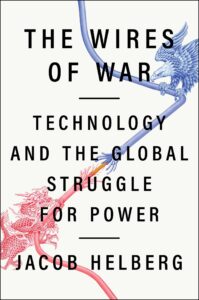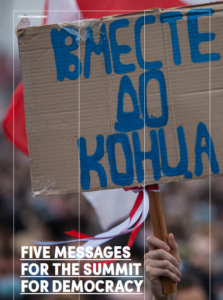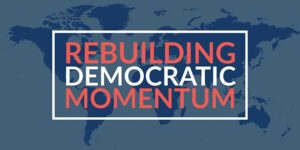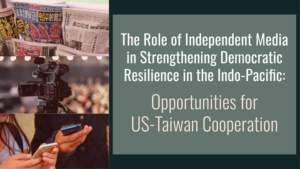 The strategic competition between the U.S. and China is more appropriately described as a “gray war,” says a prominent observer. They find themselves in a tech-fueled arms race—with repercussions involving everything from cyber-warfare to intellectual property theft – a conflict that Jacob Helberg describes in his new book, The Wires of War: Technology and the Global Struggle for Power, as a quickly escalating two-front technology “gray war” between democracy and autocracy, Fortune reports.
The strategic competition between the U.S. and China is more appropriately described as a “gray war,” says a prominent observer. They find themselves in a tech-fueled arms race—with repercussions involving everything from cyber-warfare to intellectual property theft – a conflict that Jacob Helberg describes in his new book, The Wires of War: Technology and the Global Struggle for Power, as a quickly escalating two-front technology “gray war” between democracy and autocracy, Fortune reports.
“I understand that war is a scary concept, but calling it a competition is a disservice,” Helberg told Fortune’s Brainstorm Tech 2021 conference. “At the end of the day, if Japan and Germany sell more cars than [U.S. automakers], it’s not the end of the world. Here, the political survival of democracy and equal competition is on the line. We’re not playing tennis; we’re talking about a war, because China is using every tool at its disposal.”
The democracy support community is integral to the process of cultivating democratic solidarity against resurgent autocrats, particularly when such malign forces are exploiting democracies’ vulnerabilities to further their interests. That was the message to the forthcoming Summit for Democracy from a group of pro-democracy actors working to support human rights defenders, independent media, civil society, elections, and democratic transformations.
 Five issues are of key importance for advancing democracy worldwide, according to a statement from the European Endowment for Democracy, International Institute for Democracy and Electoral Assistance (International IDEA), National Endowment for Democracy, National Democratic Institute, The Carter Center, International Republican Institute (IRI), Parliamentary Center, International Foundation for Electoral Systems (IFES), The Oslo Center, The European Partnership for Democracy, Westminster Foundation for Democracy (WFD), Demo Finland, Forum 2000, and the Netherlands Institute for Multiparty Democracy (NIMD):
Five issues are of key importance for advancing democracy worldwide, according to a statement from the European Endowment for Democracy, International Institute for Democracy and Electoral Assistance (International IDEA), National Endowment for Democracy, National Democratic Institute, The Carter Center, International Republican Institute (IRI), Parliamentary Center, International Foundation for Electoral Systems (IFES), The Oslo Center, The European Partnership for Democracy, Westminster Foundation for Democracy (WFD), Demo Finland, Forum 2000, and the Netherlands Institute for Multiparty Democracy (NIMD):
1. Show solidarity with the world’s democrats. Democracies must deploy resources more effectively to assist the citizens of autocracies and weak democracies. ….We must create stronger relationships between democratic countries and institutions worldwide, going beyond the “transatlantic” space and urging all democracies to engage in democracy assistance.
2. Renew international settings. Democracies must reform international institutions so that
they reflect and promote democratic values. …We need Special Rapporteurs or officers responsible for democracy inside such organizations as the UN, the OSCE, the OECD, the OAS, and the African Union, with broad mandates to investigate and report on democracy deterioration.
3. Scale-up support to independent, ethical media and the overall information ecosystem
to ensure access to accurate information while addressing mis-/disinformation. Democracies
must promote independent, verified, and fact-checked information…..We need to develop policy responses for regulators that balance the benefits of the free flow of information and the dangers of false and unverified information.
 4. Strengthen and support existing structures and encourage the creation of new structures and systems to enable greater transparency, accountability, and coordination among governments, technology companies, and civil society. ….We need an effective mechanism to ensure that democracy activists, human rights defenders, investigative journalists, and all vulnerable and marginalized voices are not removed from social media platforms and that all individuals are protected from online abuse.
4. Strengthen and support existing structures and encourage the creation of new structures and systems to enable greater transparency, accountability, and coordination among governments, technology companies, and civil society. ….We need an effective mechanism to ensure that democracy activists, human rights defenders, investigative journalists, and all vulnerable and marginalized voices are not removed from social media platforms and that all individuals are protected from online abuse.
5. Put our own house in order. Democracies must restore their credibility….. We must address corruption and confront kleptocracy. The world’s autocrats cannot continue to use the global financial system to hide and launder stolen money. RTWT
 The Biden administration made the right call in inviting Taiwan to the summit, say Brookings analysts Richard C. Bush and Ryan Hass. The decision to include Digital Minister Audrey Tang and Taiwan Representative to Washington Bi-Khim Hsiao is a smart choice, they add:
The Biden administration made the right call in inviting Taiwan to the summit, say Brookings analysts Richard C. Bush and Ryan Hass. The decision to include Digital Minister Audrey Tang and Taiwan Representative to Washington Bi-Khim Hsiao is a smart choice, they add:
Tang is a subject-matter celebrity in the democratic world, given her innovative track-record leading Taiwan’s efforts to counter disinformation and misinformation. She and her team have built a rapid-response system to counter Beijing’s attempts to manipulate public discourse in Taiwan, often employing humor to expose the sources of malicious information. Hsiao is a longtime trusted advisor to President Tsai who has built strong relationships across the political spectrum in the United States. Together, they will be able to speak authoritatively on Taiwan’s behalf and offer meaningful contributions to the summit’s objectives of defending against authoritarianism, fighting corruption, and promoting respect for human rights.







